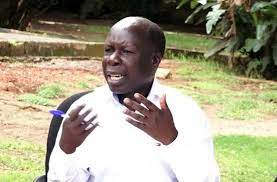The ruling National Resistance Movement (NRM) has issued strict guidelines ahead of its primary elections.
The directive, issued by the party’s Director of Legal Services, Enoch Barata, outlines mandatory legal, academic, and ethical standards that all aspirants must meet to secure nomination under the NRM ticket. The 9-page document also elaborates on strict conditions related to resignation from public service, criminal conduct, and electoral behaviour.
The nomination exercise is set to start on June 17th to June 30th 2025, while the primaries are set for July 16th.
According to Barata, the nomination of candidates is not merely an administrative step, but a constitutional responsibility that must comply fully with national electoral laws and internal party rules. Every candidate, regardless of their status or political standing, must undergo verification and clearance by the Directorate of Legal Services before nomination.
At the heart of the eligibility requirements is proof of identity and citizenship. Every aspirant is expected to present their National Identity Card or a verifiable application form from the National Identification and Registration Authority (NIRA) to establish Ugandan citizenship.
In addition, Barata states that candidates must demonstrate that they are duly registered voters with the National Electoral Commission. This is done by attaching a voter location slip that confirms the aspirant’s presence on the National Voters’ Register. Aspirants must also be registered in the party’s register, affirming their status as members eligible to participate in internal party structures and primaries.
The guidelines also set a clear threshold, particularly for those aspiring to the positions of Member of Parliament or Local Government Council V (LC V) Chairperson. Barata noted that the minimum academic requirement for such positions is the Uganda Advanced Certificate of Education (UACE), with an accompanying letter of verification from the Uganda National Examinations Board (UNEB). For candidates who did not pursue A-Level education but followed alternative educational paths, the law permits the submission of a certificate of equivalence issued by the National Council for Higher Education (NCHE).
Barata told URN in an exclusive interview that holders of diplomas or university degrees obtained from recognised institutions in Uganda or the former University of East Africa must provide certified academic documents to that effect.
The issue of name consistency is also addressed in the new directives. Aspirants whose names differ from those appearing in their academic or identification documents must provide evidence explaining the change. For minor corrections, a statutory declaration registered with the Uganda Registration Services Bureau (URSB) will suffice. However, where the change is substantial, proof of a published notice in the Uganda Gazette is mandatory, accompanied by evidence of compliance with Section 36 of the Registration of Persons Act, 2015.
Barata also said that June 14, 2025, is the mandatory deadline for all public officers intending to seek political office to resign from their positions. This applies to civil servants, employees of statutory bodies, members of the Uganda People’s Defence Forces (UPDF), the Uganda Police Force, and any other category of public servants. For parliamentary aspirants, this requirement is backed by Section 4(4) of the Parliamentary Elections Act, which stipulates that any public officer must resign at least ninety days before nomination day in the case of a general election. In the case of a by-election, Lawyer Barata states that resignation must occur at least fourteen days before nomination.
For local government aspirants, the legal provision is derived from Section 116(5) of the Local Government Act, which mandates resignation at least thirty days before nominations. Barata emphasized that candidates must present formal evidence of resignation under the terms and procedures specific to their employing institutions, as interpreted by the Courts of Judicature.
Equally robust are the provisions disqualifying individuals with certain criminal records or financial incapacities from running for office. Any person currently serving a sentence of death or imprisonment exceeding nine months without the option of a fine is barred from contesting under the NRM. Similarly, individuals who have been convicted within the past seven years of crimes involving dishonesty, moral turpitude, or violations of electoral laws are ineligible as per the guidelines.
The guidelines also prohibit defamatory or inflammatory language, incitement to public disorder, and any speech that could stir sectarianism or hatred. Candidates must refrain from making reckless statements about their opponents, including false allegations about illness, death, or withdrawal.
The use of songs, poems, or images intended to ridicule, insult, or demean another candidate is expressly banned. The use of tribal, religious, or sectarian symbols or colours in campaign material is also forbidden.
Barata emphasised that the measures are intended to promote discipline, transparency, and credibility in the party’s internal processes. He noted that the new guidelines are not only a compliance tool with national law but also a reflection of the party’s commitment to political maturity and ethical governance.
The Government Chief Whip, Hamson Obua, has been asked to disseminate and circulate the guidelines to the MPs.

